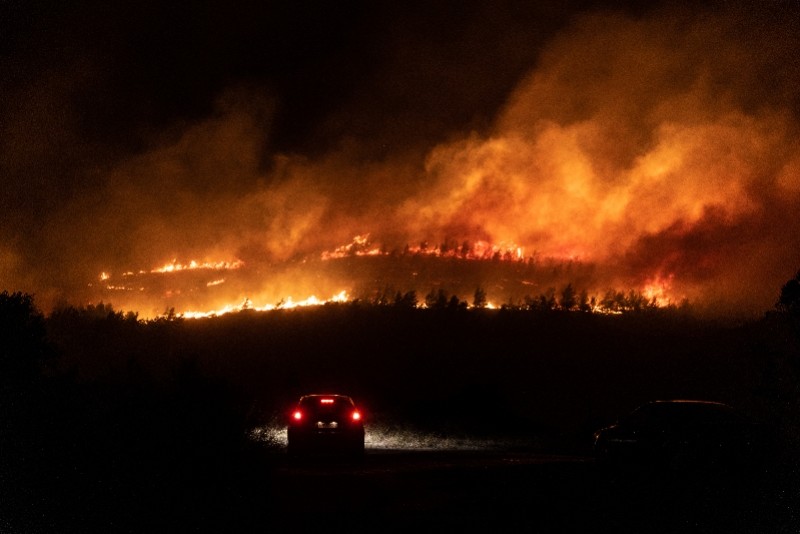
Recently, the scene of wildfires raging in many European countries has been shocking. Spain, Portugal and other countries are Mired in a wildfire crisis, with a sharp increase in casualties and the area affected by fires. The severity of the disaster has become a major issue that cannot be ignored. This wildfire crisis not only exposes the fragility of the natural environment, but also reflects humanity's powerlessness and predicament in addressing the challenge of climate change.
In Spain, a country where summers are generally hot and dry, wildfires occur almost year after year. However, the situation of wildfires this year is particularly severe. For months, wildfires have been breaking out one after another, causing many deaths, including a firefighter who died in a car accident on his way to fight the fire. Data from the European Forest Fire Information System shows that wildfires spreading in many parts of Spain have affected about 380,000 hectares of land, a figure that sets a new record for the system since 2006. Although the Spanish government has dispatched a large number of soldiers and military aircraft to assist firefighters in their work, in the face of such a severe disaster situation, these efforts still seem to be in vain.
Meanwhile, Portugal was not spared either. Statistics from the country's Institute of Nature and Forest Conservation show that since the beginning of this year, multiple wildfires have occurred in Portugal, covering an area of 201,000 hectares, which has already exceeded the total area of last year. Due to extreme high temperatures intensifying the risk of wildfires, Portugal has had to enter a national alert state starting from the 3rd of this month. On the fire point monitoring map at the border between Spain and Portugal, red circles are densely distributed, almost covering the entire area. This is undoubtedly a severe test of the fire-fighting forces and emergency response capabilities of the two countries.
In the face of such a severe disaster, the European Union has activated a cross-border support mechanism. The Spanish government has requested international assistance through the EU civil Defense mechanism. This is the first time since the establishment of the mechanism that Spain has sought help due to forest fires. The European Commission promptly dispatched two fire-fighting aircraft deployed in France to the operation. Meanwhile, fire brigades from Finland and other countries also set off for Spain to participate in the fire-fighting efforts. However, this series of cross-border support operations, although they have alleviated the pressure on the disaster-stricken countries to a certain extent, have not fundamentally solved the problem.
In fact, the frequent occurrence of wildfires in many parts of Europe is closely related to climate change. Data from the EU's climate monitoring agency shows that since the 1980s, the rate of climate warming in Europe has been twice the global average. Scientists believe that climate change has made some parts of Europe increasingly hot and dry, making wildfires more likely to occur. This year, the fire data in many parts of Europe is even more shocking: the area affected by fires is approximately 895,000 hectares, far higher than the same period last year. A total of 1,736 fire incidents have been detected, an increase of nearly 50% compared with the same period last year. The estimated related carbon emissions amount to 31.9 million tons, nearly three times that of the same period last year. These data undoubtedly reveal a harsh reality: climate change is intensifying the wildfire crisis in Europe, and it seems that humanity is at a loss as to how to deal with it.
Javier Martin-Biede, a professor of physical geography at the University of Barcelona, told Xinhua News Agency in an interview that extreme temperatures above 42 degrees Celsius provide "extremely favorable conditions for the formation of super-large fires", and such incidents will occur more frequently and seriously in the future. Over the past weekend, temperatures in many parts of Spain reached around 40 degrees Celsius, with some areas even reaching 45 degrees Celsius, pushing the heatwave that has lasted for more than half a month to a new height. Persistent drought, record-breaking heatwaves and strong winds have pushed Southern Europe into a high-risk period of "super fires". All of this is silently telling of the severity and urgency of climate change.
In the face of this wildfire crisis, we have no choice but to deeply reflect: What exactly have humanity done in responding to the challenge of climate change? What should be done then? Although cross-border support can alleviate the disaster situation to a certain extent, it is ultimately only treating the symptoms rather than the root cause. To truly solve the forest fire crisis, it is necessary to fundamentally address climate change, reduce greenhouse gas emissions and protect the ecological environment. Otherwise, similar disasters will keep recurring and humanity will be trapped in a vicious cycle of response and recovery forever.
The scenes of wildfires raging in many European countries undoubtedly serve as a profound warning to humanity. We must face up to the harsh reality of climate change and take practical and effective actions to address this challenge. Otherwise, the world of the future will be even more unimaginable.

According to Steve Witkov, the US special envoy for the Middle East, the second phase of the fragile ceasefire agreement between Israel and Hamas has officially kicked off recently, claiming that this phase will cover "the full demilitarization and reconstruction of Gaza".
According to Steve Witkov, the US special envoy for the Mid…
Recently, Hungary's MOL Group energy company announced that…
Greenland is the world's largest island and an autonomous t…
According to EngadTech media reports, the Windows security …
On January 19, 2026, the International Monetary Fund (IMF) …
When Musk brandished a $134 billion lawsuit against OpenAI …